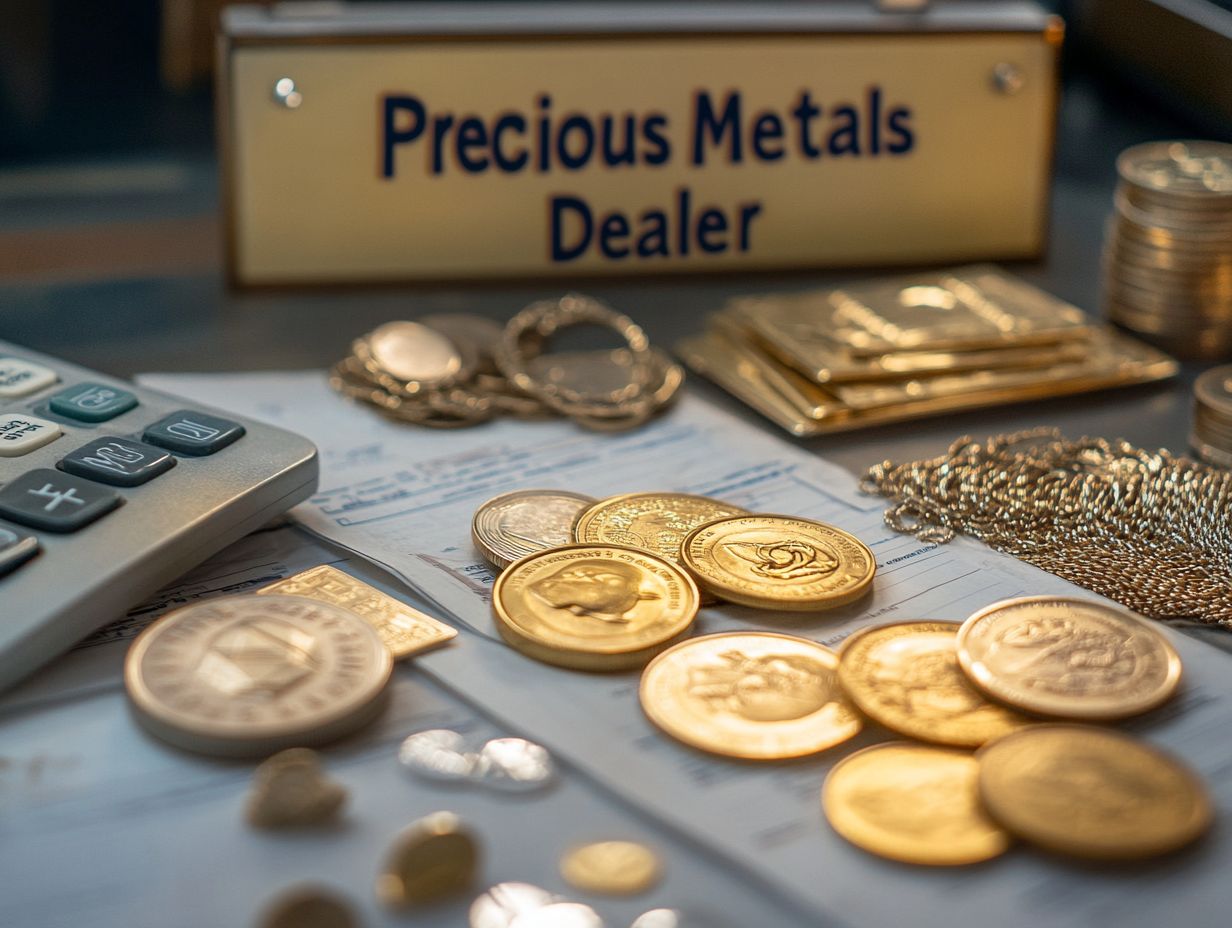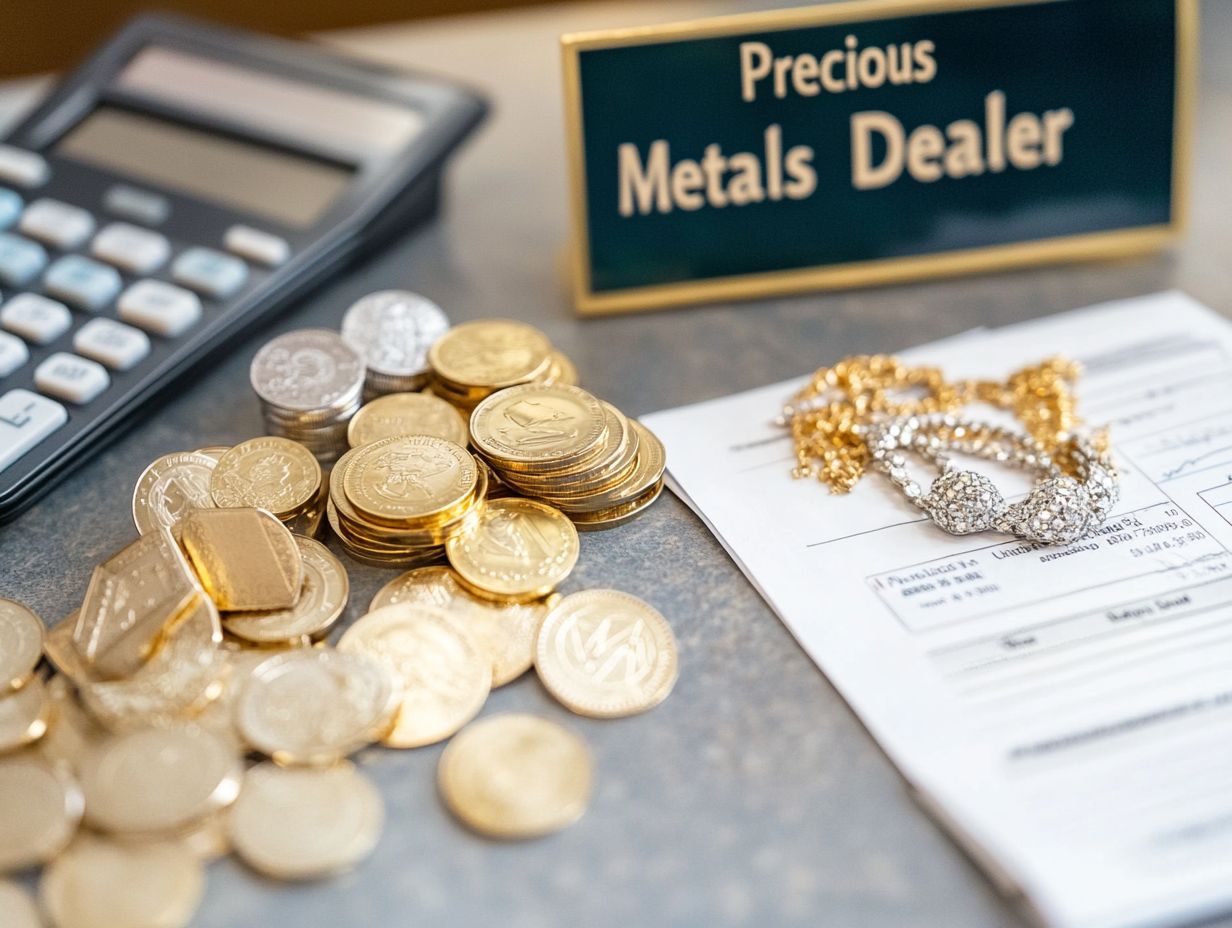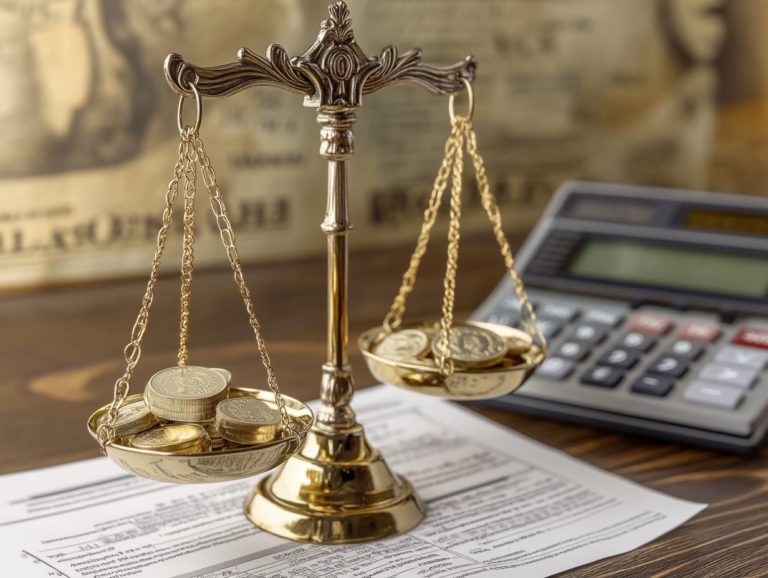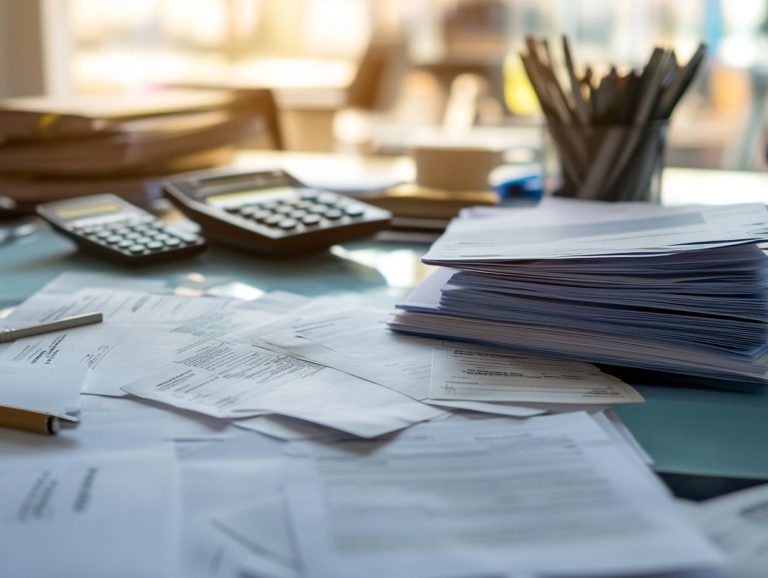Tax Implications of Selling Precious Metals to a Dealer
Navigating the world of precious metals can be exhilarating. It can also be daunting, especially when selling your assets.
Understanding precious metals dealers is vital. They facilitate transactions and affect the tax implications of your sales. The financial landscape, from capital gains tax to reporting requirements, can indeed be intricate.
This guide provides you with essential insights into the factors affecting taxes, strategies to minimize liabilities, and key considerations for selling precious metals.
Equip yourself with the knowledge you need to sell with confidence!
Contents
- Key Takeaways:
- Understanding Precious Metals Dealers
- Tax Implications of Selling Precious Metals
- Factors Affecting Taxes on Precious Metals Sales
- Strategies for Minimizing Taxes on Precious Metals Sales
- Other Considerations when Selling Precious Metals
- Frequently Asked Questions
- What are the tax implications of selling precious metals to a dealer?
- Do I have to pay taxes on every precious metal sale to a dealer?
- What is the capital gains tax rate for selling precious metals to a dealer?
- Are there any exemptions for taxes on precious metal sales to a dealer?
- Do I have to report my precious metal sales to the IRS?
- Can I deduct any expenses related to selling precious metals to a dealer?
Key Takeaways:
- Selling precious metals can trigger capital gains taxes, which vary based on the type of metal and how long it was held.
- Timing the sale strategically and offsetting any gains with losses can help minimize taxes on precious metals sales.
- It’s important to keep accurate records and documentation of precious metals sales for tax purposes, and be aware of any state and local taxes that may apply.
Understanding Precious Metals Dealers
Understanding how precious metals dealers operate is crucial for anyone considering an investment in commodities like gold, silver, platinum, and palladium. These dealers act as intermediaries, guiding you through the intricacies of the market while facilitating the buying and selling of precious metals.
Whether you’re intrigued by iconic gold coins such as the American Gold Eagle or the Canadian Gold Maple Leaf, or if you’re leaning toward other forms of bullion like gold bars and silver coins, it’s essential to know how these dealers function. Familiarizing yourself with their pricing structures and the quality of the products they offer is key.
Who are Precious Metals Dealers?
Precious metals dealers are specialized professionals dedicated to the buying and selling of metals like gold and silver. They serve both individual and business customers.
These dealers are essential players in the investment landscape, acting as intermediaries who guide you through the complexities of the market. They operate from local shops, where personal service and trust take center stage, or through online platforms that provide convenience and real-time market values.
Each type of dealer enriches the ecosystem by grading metals based on purity and weight. These factors significantly impact their market value. Whether you’re seeking bullion, coins, or bars, understanding the options available empowers you to make informed investment decisions.
Tax Implications of Selling Precious Metals
The tax implications of selling precious metals can profoundly influence your overall investment returns. It is essential to grasp the nuances of capital gains tax as defined by the Internal Revenue Service (IRS).
When you sell gold, silver, or other precious metals for more than what you paid, you may face capital gains tax. This is the tax you pay on the profit made from selling an asset. It could be classified as either long-term gains or ordinary income, depending on how long you held the investment and its specific nature.
Understanding the particular reporting requirements and how these taxes can affect your investment portfolio is vital.
Capital Gains Tax
Capital gains tax is a vital consideration when selling precious metals, as it dictates how much you’ll owe to the IRS based on the profit from your sale.
Grasping the differences between short-term and long-term capital gains tax rates is crucial if you’re trading gold, silver, or other valuable metals. Generally, holding these assets for over a year before selling allows you to take advantage of lower long-term rates.
If you sell within a year, you’ll face higher short-term rates that mimic ordinary income tax. This distinction can dramatically impact your net profits, emphasizing the necessity of crafting a thoughtful sales strategy that considers these tax implications.
Reporting Requirements
Understanding the reporting requirements tied to selling precious metals is crucial for staying in compliance with IRS regulations and steering clear of potential penalties.
As you navigate the complex landscape of financial transactions, it’s vital to remain vigilant about the necessary forms. This includes completing Form 1040 for your individual income tax. You should also utilize Schedule D to accurately report any capital gains or losses from these transactions.
Don’t underestimate the importance of Form 1099-B; it’s essential for detailing sales proceeds associated with financial securities in your investment portfolio. By committing to diligent reporting, you not only reduce the risk of incurring fines but also maintain a clear financial record that will be invaluable for your future planning.
Factors Affecting Taxes on Precious Metals Sales
A number of factors can significantly impact the taxes you’ll owe when selling precious metals. Consider the type of metal you’re selling. Also, take into account the duration of your holding period and the dealer’s markup on the sale price.
Each of these elements can influence the amount you owe in taxes on profits from the sale, shaping the financial landscape of your transaction.
Type of Metal and Holding Period
The type of metal you’re selling—be it gold, silver, or another precious metal—along with the holding period can significantly influence your capital gains tax obligations.
The IRS classifies different metals into categories that dictate their tax treatment. This classification can impact their investment viability over time. For example, you might find that gold coins and bars come with different tax implications compared to silver or platinum.
You must recognize that values can fluctuate quickly, impacting your investment. Understanding these classifications and their effects on holding periods is crucial for you as an investor.
If you hold a metal for over a year, you generally qualify for lower long-term capital gains tax rates, which encourages longer-term investments in precious metals. Remember, these assets can be subject to both appreciation and depreciation, so it’s wise to approach them with a strategic mindset.
Dealer’s Markup and Commission
The dealer’s markup and commissions can significantly influence the effective market value of your precious metals when you’re ready to sell. These added costs can reduce your overall returns, making it crucial to scrutinize the fees tied to each transaction.
As an investor, recognize that the decisions you make at the beginning can impact both your investment portfolio and potential liquidity. Compare different dealers and their costs closely. This helps you find the best deals and maximize your profits.
A comprehensive evaluation of different pricing structures gives you the power to uncover the most advantageous offers, ultimately leading to better financial outcomes and a higher return on investment.
Strategies for Minimizing Taxes on Precious Metals Sales
Act now to minimize taxes on your precious metals sales. This will help you keep more of your hard-earned money. By carefully timing your sales and offsetting gains with any losses you’ve incurred, you can significantly enhance your financial outcomes.
Timing the Sale
The timing of your sale of precious metals can greatly influence the capital gains tax you owe, especially when considering market conditions and price fluctuations.
Understanding this dynamic helps investors maximize returns. Analyze market trends by keeping a close eye on various economic indicators such as inflation rates, interest rates, and geopolitical events that can sway commodity prices.
For example, if inflation rises, the demand for precious metals might increase, signaling a potentially advantageous time to sell. Stay updated on industry reports and analyst forecasts to spot possible downturns. This allows you to strategically plan your exit and optimize your market value.
By implementing these investment strategies, you pave the way for a knowledge-based decision-making process.
Offsetting Gains with Losses
Offsetting gains with losses is a savvy strategy that can significantly reduce your overall capital gains tax liability when selling precious metals.
Utilize capital losses from other investments, like stocks or real estate, to effectively lower the taxes owed on any profits from precious metals. This tactic is especially advantageous during tax season, helping you maintain a more balanced and optimized investment portfolio.
As you navigate the reporting requirements, accurately document both gains and losses on your tax returns. This ensures compliance while minimizing your taxable income. This strategy not only aids in tax reduction but also encourages a comprehensive perspective on your investment landscape.
Other Considerations when Selling Precious Metals
When selling precious metals, consider various factors beyond the transaction itself. Diligent record-keeping is crucial, as is understanding the state and local tax implications that may arise.
Being mindful of these details can significantly enhance your investment strategy and ensure a smoother selling experience.
Record Keeping and Documentation
Effective record keeping and documentation are essential for anyone aiming to sell precious metals. They ensure compliance with IRS regulations and facilitate accurate reporting of capital gains.
Maintaining organized records provides peace of mind and smoothens the process during tax season. Make sure to keep purchase invoices as proof of acquisition costs and sales receipts that document your transactions.
Any related paperwork, such as tax forms or documentation regarding financial securities and investment strategies, should also be included. This comprehensive approach aids in determining your gains or losses and is vital in the event of an IRS audit.
By keeping meticulous records, you can navigate the complexities of financial reporting with greater ease and ensure your investments remain safeguarded.
State and Local Taxes
In addition to your federal capital gains tax obligations, consider the potential impact of state and local taxes when selling precious metals. Each state has its own set of regulations and tax codes, which can significantly influence your net profits from these transactions.
For instance, some states may impose a higher sales tax on precious metals or offer specific exemptions, while others might not tax these assets at all. Understanding how different local tax brackets apply is crucial for assessing your overall liability.
Stay aware of the reporting requirements to ensure compliance; neglecting this can lead to unwelcome penalties. Staying informed about local taxation laws not only helps you maximize your returns but also minimizes any legal risks you may face.
Frequently Asked Questions
Contact a tax professional today to optimize your selling strategy!
What are the tax implications of selling precious metals to a dealer?
When you sell precious metals to a dealer, you may face a tax on your profit. This tax is known as capital gains tax, and it’s based on the profit you make from the sale.
Do I have to pay taxes on every precious metal sale to a dealer?
Not always! If you sell precious metals from your personal collection and your total sales are below the IRS reporting threshold, you may not owe any taxes. But if you sell them as a business, you must report all sales and pay taxes accordingly.
What is the capital gains tax rate for selling precious metals to a dealer?
The tax rate on profits from selling precious metals varies. Generally, it can range from 0% for lower-income individuals to 20% for those with higher incomes.
Are there any exemptions for taxes on precious metal sales to a dealer?
Exciting news! Certain exemptions exist for taxes on precious metal sales. For instance, if you sell inherited metals, you might claim a higher value and avoid taxes on the sale.
Do I have to report my precious metal sales to the IRS?
If your total sales exceed the IRS reporting threshold, you must report them on your tax return. Not reporting can lead to penalties and fines, so stay compliant!
Yes, you can potentially deduct expenses like transportation costs and dealer fees. Just keep thorough records and consult a tax professional to ensure your deductions are valid.


















